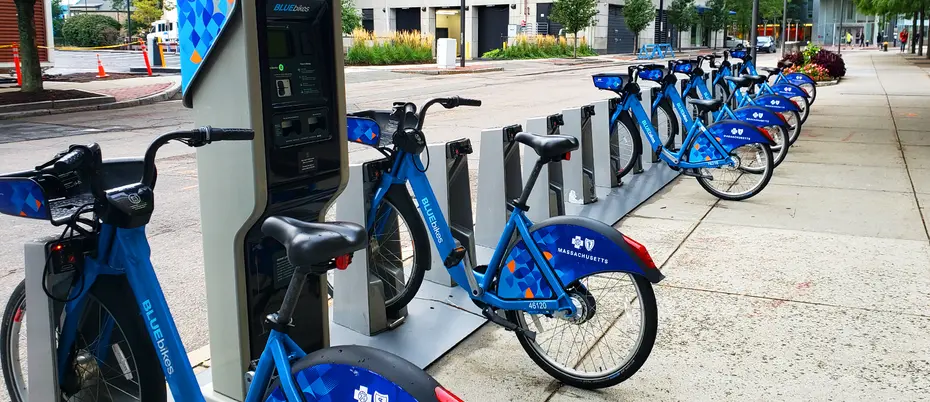Analytics
Innovating for a smoother ride: Research from MIT Sloan shows how algorithms and analytics can help make urban bike-share programs be more efficient and user-friendly
The research has implications for tackling decision-making problems in the sharing economy
Cambridge, Mass., August 21, 2019 — Sophisticated algorithms and advanced analytics can help bike-share programs run more efficiently with improved maintenance orders and incentives for riders to move bikes where and when riders need them most, according to new research from the MIT Sloan School of Management.
Cities across the U.S. — including New York, Washington, D.C., Boston, and San Francisco — have implemented bike-share programs as a means to ease congestion, improve public health, and cut carbon emissions. Cyclists in those cities, meanwhile, have embraced bike-sharing to make their commuters faster, cheaper, and more fun.
But for all the advantages these programs offer, “significant challenges remain,” says, Assistant Professor of Operations Management at the MIT Sloan School of Management, and one of the study’s lead investigators. “Despite the fact that general demand patterns are predictable in aggregate, bike-share systems are complex networks and operational decisions involve plenty of subtleties. We cannot rely on our intuition to make these decisions; instead we must take a data-driven approach.”
The distribution of bikes, for instance, is a persistent challenge. Because of commuting patterns, residential neighborhoods face shortages of bicycles in the morning rush, while business districts tend to run out of bikes in the evening. What’s more, parking docks can be full at certain hours, making it hard for riders to return the bikes once they’ve reached their destinations.
During peak commuting hours, bike-share systems often must race against riders to remove bikes from fully occupied dock stations and refill them in stations where they are needed—a complicated juggle known as rebalancing. Many systems rebalance their bike supply using fleets of box trucks that reallocate dozens of bikes at a given time. This is a costly, time-consuming endeavor that enlarges the systems’ carbon footprint. Thus, it is crucial that rebalancing be as efficient as possible.
Prof. Freund and his colleagues, Profs. David B. Shmoys and Shane G. Henderson of Cornell University, as well as Hangil Chung, a Cornell graduate, and Eoin O'Mahony a Cornell Ph.D, set out to find a solution to the problem.
Working with Motivate, (now part of Lyft) which runs some of the biggest bike-sharing systems in the country, the researchers devised a program, called Bike Angels, that incentivizes riders to rebalance bikes. Cyclists earn points by renting or returning bikes at certain high-need stations. As reward, riders receive modest discounts and prizes.
Initially, the program awarded points for the same pattern of stations every morning, and a different fixed pattern each afternoon. In a study, though, the researchers found that these fixed patterns cause inefficiencies when returns (or rentals) are incentivized in locations where they do not actually help with rebalancing. These inefficiencies are not only due to imperfect demand forecasts, but also to heterogeneity within individual rush hours.
The program, which was piloted in 2015, today accounts for roughly 30% of bike rebalancing in New York City, according to Motivate. “Bike Angels helps keep the entire system balanced so that cyclists can have more confidence that they will be able to get a bike when and where they need it,” says Prof. Freund. “It has boosted customer satisfaction which, in turn, has increased ridership. And importantly, this form of rebalancing comes with a much smaller carbon footprint than box trucks.”
Prof. Freund and his colleagues applied analytics to solve other problems, as well. For example, they developed an algorithm to helps bike-share programs remotely identify faulty equipment. “By analyzing usage information on a daily basis, we help platforms make accurate determinations about whether they need to send out crews to fix a broken bike or dock,” he says. “Dealing with maintenance issues in a timely manner makes these programs run more efficiently.”
Prof. Freund says that applying a data-driven approach to solving transportation challenges represents “an opportunity for academia to play a role in shaping the societal changes caused by new technologies” in the sharing economy. “New mobility options, including e-bikes and free-floating bike-sharing systems, are critical to moving cities to a more sustainable foundation,” he says. “But these systems also pose operational challenges. Sophisticated algorithms and advanced analytics can help these programs — and society at large — pedal in the right direction.”




